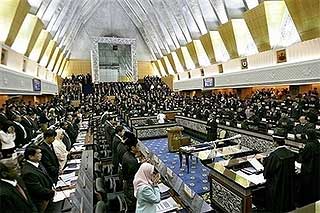Vikraman Selvaraja explores an alternative to the current parliamentary representation.
Gerrymandering? Malapportionment? Unfair delineation? There are a lot of words with more than three syllables being thrown around on the issue of electoral (there I go again, four syllables!) reform recently in the twittersphere and online media. Personally I’m quite a fan of big words, but I’ll refrain from them as much as I can in this short article.
The failures of the hand-me-down electoral system that we received from our colonial masters (thanks to their desire to give power to UMNO) have been well documented, and I’m not about to rehash those – LH Hai does a very good job explaining them in his work “Electoral Politics in Malaysia: ‘Managing’ Elections in a Plural Society”.
Of course, in Malaysia’s complex federal, geographical and ethno-cultural makeup, changing the electoral system to one which reflects the will of the people while giving minorities adequate representation requires creative thinking and consideration. Fortunately for us, someone else has done all that boring consideration stuff already.

This then brings me to my main point: a Malaysian contextualisation of the mixed-member proportional electoral system (MMP). The MMP is currently being used in a whole slew of countries, including Germany and New Zealand and has been recommended for use by Law Reform Commissions in Canada, Australia, USA, UK and pretty much everywhere that imported the Westminster brand of elections. They have not come into use more widely because the dominant political parties in all these countries realise that they would actually be forced to move to the centre and convince an actual majority of the electorate that they’re worth re-electing. Far easier to sit on the loony right (or the deluded left) and spew polemic instead!
Why the MMP, you ask? The MMP can preserve small-ish constituencies (yes, you can still call your MP and complain about the state of your longkang and potholes, and they’ll still have to do something about it because you voted them in!), unequal representation for rural electors and electors of ethnic minorities (eg rural Sarawak/Sabah), strong party structures and governments, AND as an added bonus involve absolutely no change to the current voting and ballot counting process, constituency boundaries and geographical representation. All of this while ensuring that the parties that gets the most popular votes wins the election. Sounds almost too good to be true, doesn’t it?
But wait! I know what you’re thinking:’This guy is some sort of expert snake oil salesman. You can’t keep a shockingly inequitable system and somehow make it equitable over night while preserving its form!’ Well to you I say, I’m actually a snake-wine salesman. Snake wine is pretty great, delicious, exotic, and gets you drunk…
Wait, where was I going with this?

Ah yes, electoral reform and the MMP. Essentially, the MMP system adds up all the MPs who won their respective constituencies the good old-fashioned way (BR1M anyone?) and just adds MPs to parties to preserve their relative share of the vote. Parties that are over-represented on a constituency basis don’t lose any seats; their opponents just gain some instead. Every party has to submit a list of people and if they only gain 15% of the seats on a constituency basis despite winning 25% of the popular vote, MPs will be appointed off their list from the one ranked #1 onwards until that 10% quota is filled. Simple as that. To prevent too many parties being in Parliament, a minimum quota is usually required, with 1 or 2 % of the nationwide vote to actually be represented. However, if a candidate from a party wins a seat, they take it regardless of the percentage of votes their party gets nationwide, allowing overrepresentation of East Malaysian parties.
If this was put in place in the 2013 elections, UMNO-BN’s 133 MPs would have all continued to sit exactly where they are, but an additional 53 MPs would have been appointed from the PR parties lists (the bulk of which would be PKR and PAS MPs, as they were the most underrepresented) creating a parliament which sits 142 PR to 133 UMNO-BN for a vote split of 51.7:48.3 (correcting for the unrepresented parties who came in below 1%, the actual majority being 50.8:47.4).
Voila, PR becomes the new federal government, respecting the wishes of the people with no changes made to the electoral system at all, aside from having a few more MPs (party hacks probably) added to the Dewan Rakyat.
Unfortunately, this (minor) change requires an amendment to the federal constitution as the current electoral system is constitutionally enshrined. That’s never going to happen politically as UMNO knows that sure as the sun rises, they’ll lose power should they agree to this.
There’s always tomorrow, I guess. Until then, enjoy the snake wine, because I sure am!

Lewin emphasized the importance of social action research, the study of relevant social problems with a view to introducing change. Reflecting his concern about racial problems, he conducted community studies on several topics–integrated housing and prejudice, equal employment opportunities, and the development and prevention of prejudice in childhood. His social action research transformed these issues into controlled research studies, applying the rigor of the experimental method without the artificiality of the academic laboratory.
The British did no draw our constituencies. In the general elections I in 1955
there were only 52 constituencies. They were evenly matched. At that time the rural folk had not migrated in large numbers to urban areas. Now we have 222 constituencies. Blaming the British for all our ills after so many years is boring.
Kanesalingam
I didn't blame the British for (all) our ills. Only one. That we were cursed with the FPTP electoral system when even in 1955 everyone knew the STV/MMP system was better or even the Australian Preferential Ballot system. If you read LH Hai's work he explains a number of the historical "bargains" struck between the Reid Commission and the Alliance regarding the electoral system (of which almost all was to create an unfair playing field tilted in favour of the Alliance)
Our Parliament can be much improved if (1) the electoral constituencies are properly delineated and (2) the constituencies have similar number of voters; the Constitution originally permits variation of up to15% only (the provision was later removed by amendment). The MPs' main concerns would or should likely be local – investments & jobs, infrastructure & "development".
Our Senate is where I would use proportional representation. Senators would act in line with party manifestos; their concerns should be national issues if the party is national. Presently, our senators are appointed on advice of the party in power.
That's similar to the Australian system however it doesn't support the existence of multiple strong parties in the house of "government" which in other Federal systems has always been the lower house. The moment you have more than 2 strong parties in the lower house in any FPTP system you end up with ridiculous situations like a party winning only 30% of the popular vote but a clean majority of seats (like the current Canadian government.)
While I agree that MMP is definitely much better than FPTP (assuming number of party-list seats is at least 50% of parliamentary seats), is there a reason to prefer MMP over other proportional-representation systems, such as open-party-lists or single-transferable-vote?
Well the thing about MMP is that it preserves constituencies. There is still one person who is "your" MP. In an STV system you don't have an MP who in theory reports to his constituents. Now I like having someone to call and complain about my longkang, you might not think that's necessary I guess.